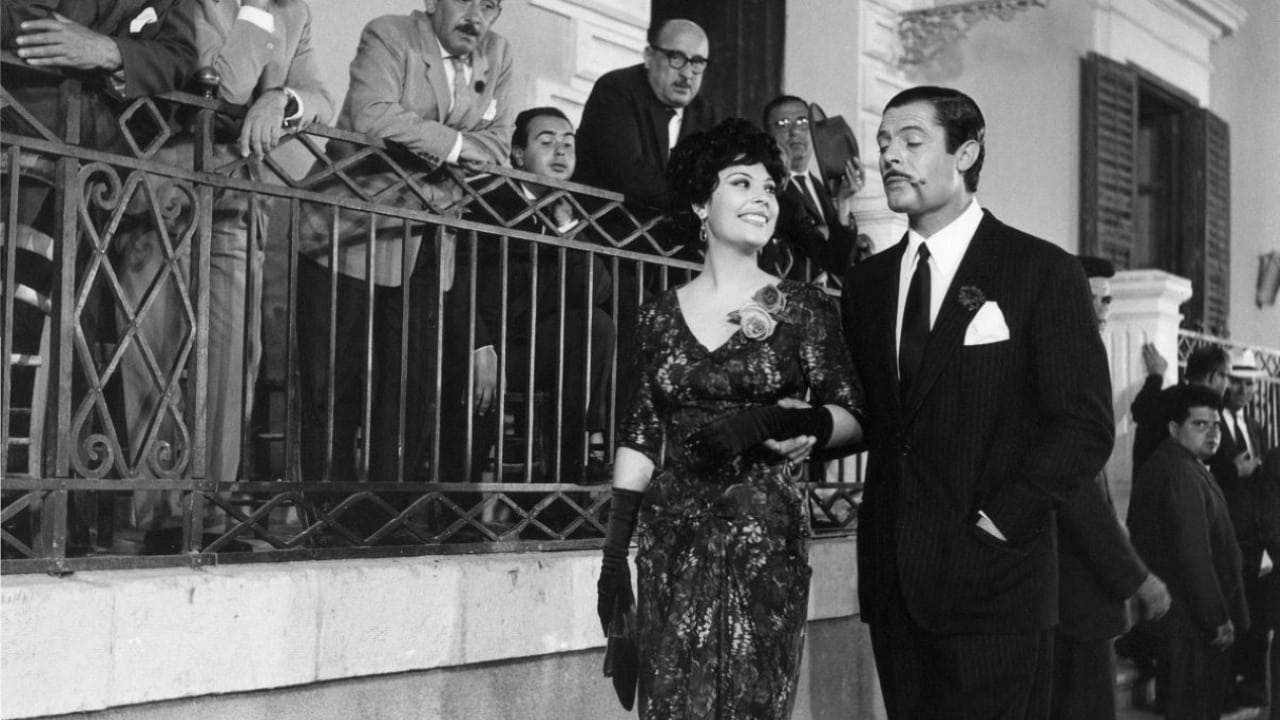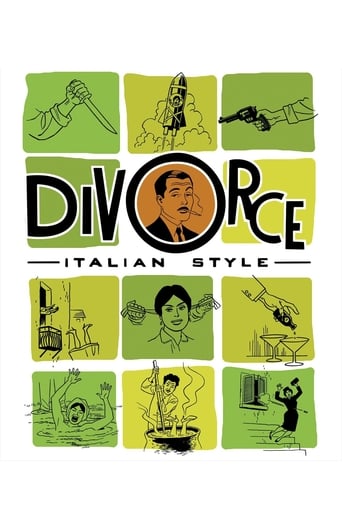

Good story, Not enough for a whole film
... View MoreA clunky actioner with a handful of cool moments.
... View MoreIt is encouraging that the film ends so strongly.Otherwise, it wouldn't have been a particularly memorable film
... View MoreAn old-fashioned movie made with new-fashioned finesse.
... View MoreWriter, director Pietro Germi crafted a comic masterpiece in Divorce Italian Style, a 1961 black comedy that mocked the archaic Italian divorce laws along with the extreme measures one man takes to detach from his spouse. It a mordantly hilarious, as well as every other kind of hilarious, from start to finish as Germi's energetic script pursues a bungling murder plot while making a humorously acerbic commentary on class, family, the justice system The Catholic Church and Sicilian custom, all carried along by the most romantic music score of its day.Baron Cefalu (Marcello Mastroianni)has become bored with his wife (Daniella Rocca) and enamored with his 16 year old niece Angela. When she reciprocates the baron looks for a way out in a country where divorce is illegal. He eyes honor killing as a way out but has to find a way to get her to be unfaithful. The plot now unfolds with one misstep after another by Cefalu that nevertheless pays off.Shot in the sizable town of Catania, Sicily everyone from actor to extra performs exceptionally whether going into operatic outrage, trading glances, hand gestures or even crowd gathering, with wonderful naturalism. Mastroianni gives arguably the finest performance of a superb career with his iconic lothario self parody that only he could carry off in such a sincere manor. In addition he manages to transcend eras by chipping in one of the best silent performances of any era as well. The tragic Daniella Rocca is comically touching, while Leopold Trieste as a sly artist and Pietro Tordi as a lawyer give excellent turns along with all the household figures making the most of their brief scenes as well as the youthful Stephania Sandrelli transitioning from beatific to sensual.With its spirited narration and the determined energized Cefalu's zany plan consolidation Germi hits one target after the next with sharp comic precision as he swiftly covers a lot of ground.Adding enormously to the film's dark vein is the subversive employment of Carlo Ruscitelli's melodically beautiful but syrupy backdrop that may momentarily deceive us into wishing the nefarious Cefalu well.Well paced, beautifully scored, perfectly set and cast but most of all flat out funny Divorce Italian Style clicks on all cylinders from start to finish.
... View MoreDefinitely a classic film, but not just an Italian classic! "Divorzio all'italiana" centers itself around Ferdinando Cefalù (Mastroianni), a 37 year old baron in a small town. Although he's a baron, his life is not completely perfect as his father has squandered much of their money, and his extremely clingy wife Rosalia stands between him and the only thing he loves, his 16 year old cousin Angela. To add salt to the wound, 1960's Italy does not allow couples to divorce, which leads Ferdinando to seek desperate measures. After a town scandal erupts, when a woman murders her cheating husband to protect her honor, Ferdinando is inspired to set up his wife with a lover in order to kill her and "protect his honor." The rest of the movie chronicles Ferdinando's attempts to find someone who would fit the bill."Divorzio all'italiana" is a satirical look at Italian society and its seemingly backward laws which force people to do stupid things and its fallibility at justice. In its social commentary of Italian laws/society, Concini, Germi, and Giannetti (the writers) create well fitted, stereotypical characters that are much needed in order for the message of the film to get across. Ferdinando plays the evil nobleman, Rosalia as the annoying wife, Angela as the desirable secret teen lover, etc. The beauty of the story not only lies in it's scathingly funny humor, with Ferdinando's clever plotting and hallucinations of killing his wife, but also in its ability to transcend time. Nowadays there are no laws that forbid divorce in most societies, but even though that crucial point does not relate to modern audiences, the film is still able to conjure emotions for the characters' plight. Another great thing about the film, is the idea of a protagonist character with typically antagonist characteristics. Ferdinando is definitely a bad man, but the story plays with the audience in making them want Ferdinando to succeed in his plot. To add to the underlying theme of the film, the failure of Italian laws, is the theme of "justice" whether it be from the law or from a simple reversal of fate. Definitely watch the film up to the very end, as it closes with an ironic yet justified twist of fate for the characters involved.
... View MoreI love this movie. It's one of those masterpieces in which everything - direction, acting, script, music - is so flawless, the result is almost miraculous. This wickedly funny gem by Pietro Germi is one of the greatest Italian comedies, and also a biting satire.Sicilian baron Fernando Cefalù (Mastroianni, exceptional) falls in love with Angela (Stefania Sandrelli). To marry her, Fernando needs to get rid of his annoying wife Rosalia (Daniela Rocca), so he manipulates his spouse into betraying him with Carmelo (Leopoldo Trieste); according to the old Italian penal code, any husband who killed an adulterous wife would get a mere three years sentence.Mastroianni carries the movie with a note-perfect performance as the baron, a deadpan, amoral man with an utterly phoney sense of honor. Pirandello would have loved this two-faced character. Supporting actors are wonderful too, from Daniela Rocca as the archetypal obnoxious wife to Leopoldo Trieste as her awkward lover, from young Stefania Sandrelli to minor players in small roles (like the pompous lawyer or the mob boss).The Academy Award-winning script has an hilariously cynical streak. The soundtrack is genius and used in an unforgettable way - who can forget the sardonic march as Cefalù struts around the town while everybody whispers behind his back?10/10
... View MoreMarcello Mastroianni is a great actor but who does he want to fool with those little mustaches playing the part of a Sicilian? He doesn't make sense. He isn't credible. With this premise the movie is all downhill. Mastroianni overacts making his part furthermore less credible. All the actors overact and the movie becomes a mess. Pietro Germi lost control. If everyone was a little more serious this could have a been a great comedy.The director will make a sort of masterpiece with SIGNORE & SIGNORI (Ladies & Gentlemen) but 4 years will have to pass.The DVD I saw had images of bad quality. Being an Italian movie unfortunately it often happens.
... View More